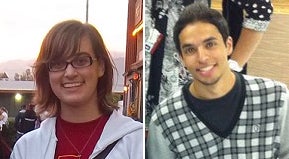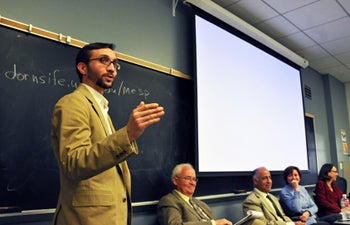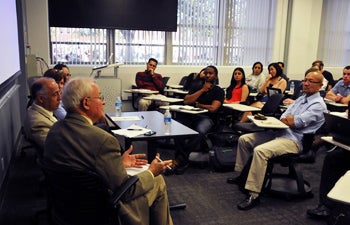The Middle East: Choose Your Lens
The Middle East cuts a wide swath: it contains a number of countries, a multitude of languages, cultures and customs, and thousands of years of history. Interests and conflicts resonate on a global scale, such as the unprecedented uprisings that have recently swept throughout the region. Not to mention it’s the birthplace of three of the world’s major religions — Islam, Judaism and Christianity.
Launched in Fall 2011, the Middle East Studies Program in USC Dornsife offers students a chance to dig deeper into the area from the ancient to the present through a major or a minor.
“There’s hardly a single country in the region that hasn’t been in the headlines in the last year,” said program director Kevin van Bladel, associate professor of classics. “The Middle East Studies Program provides students an opportunity to explore the area in a critical way from a variety of perspectives.”
A hallmark of the program is its interdisciplinarity. Students can choose from courses in American studies and ethnicity, anthropology, classics, economics, history, foreign languages, international relations, Judaic studies, linguistics, political science and religion. Altogether 18 faculty members from 12 departments teach within the program.
For freshman Caitlin Wilhelm, the wide range of offerings in a variety of disciplines was central to her decision to select Middle East studies as her major. She said she’s naturally drawn to the humanities, and is especially interested in learning about history, culture and foreign languages. The Middle East Studies Program lets her combine all of her interests.
“I love the spectrum of classes that I can choose from,” said Wilhelm, who has a second major in linguistics. “They allow me to get a diverse background in the Middle East and gain a fuller understanding of the region.”

A hallmark of the Middle East Studies Program is its interdisciplinarity. Students can focus their studies by selecting from a spectrum of courses from different departments in USC Dornsife and also take advantage of study abroad programs. Caitlin Wilhelm (left) is combining courses in history, culture and foreign languages. Ramy Rashad (right) will travel to Egypt to study the upcoming presidential elections as part of an independent study project.
In high school and middle school, Wilhelm studied Arabic, German, Japanese, Spanish, French and Mandarin. In the Middle East Studies Program, she intends to add Hebrew and Persian to her repertoire while continuing to build her skills in Arabic at USC Dornsife.
Wilhelm is also taking a course offered through the department of history and American studies and ethnicity called “Arabs in America,” which looks at Arab immigration and acculturation in the United States. By combining her language experience with cultural studies she’s gaining deeper insight in her scholarship, she said.
“Having a background in the language of a culture is so valuable for understanding more about the people and history of the culture you’re studying,” Wilhelm said.
For example, formal Arabic and colloquial Arabic are different from each other and understanding the language offers a window into the culture, said Sarah Gualtieri, who teaches “Arabs in America.”
“There’s a difference between the formal, classical language of Arabic — what you’d read in a newspaper or hear if you turned on Al Jazeera. Then there’s the colloquial language — the language of everyday speech. And this can differ between Egyptians, Palestinians and Lebanese, for example,” said Gualtieri, associate professor of history and American studies and ethnicity.
“I’ve seen how Caitlin picks up on these nuances. Some of the films we watched in class are partly in Arabic and partly in English, and I could sense her being drawn into the films in a deeper way because of her study of Arabic,” Gualtieri said.
The Middle East Studies Program also hosts a number of events to take learning beyond the classroom.

Kevin van Bladel (left), director of the Middle East Studies Program, introduces panelists at “Taking Stock of the Arab Uprisings,” a recent lunchtime event hosted by the program. Seated, from left to right: Jeff Nugent of economics, Fayez Hammad of international relations and political science, Laurie Brand of international relations, and Rym Kaki of the USC Sol Price School of Public Policy. Photo by Michelle Salzman.
Recently, the program hosted a lunchtime discussion, “Taking Stock of the Arab Uprisings,” to assess the revolutions that have taken place over the past year throughout the Arab world. Students and guests crowded into a classroom to hear professors from the departments of international relations, political science, economics and the USC Sol Price School of Policy parse through the significance and impact of the events unfolding against authoritarian regimes throughout the region.
Shams Hirji, an accounting major and classics minor, attended the talk to gain perspective on what he described as a “once-in-a-lifetime” revolt.
“It helps to hear what USC scholars have to say about what’s going on,” Hirji said. “It’s a great filter about a real-world event.”
Hirji’s participation meets a goal of the Middle East Studies Program.
“We want students to interact with professors,” van Bladel said. “At an event such as the discussion on the Arab uprisings, students can jump into a live conversation with experts on what’s happening right now in the Middle East.”
The program also hosts mixers to give students and faculty an opportunity to get to know one another and make academic and research connections. Sophomore Ramy Rashad said one such gathering where he met Professor Laurie Brand was particularly fortuitous for him.
As a result of their meeting, the two developed an independent research project for Rashad, who is a neuroscience major and a Middle East studies minor. Rashad will travel to Egypt this summer and study how the presidential election to replace former president Hosni Mubarak, who ruled Egypt for nearly 30 years, unfolds in Cairo. Rashad plans to meet with a former Egyptian ambassador to Iran and Afghanistan, and also interview civilians about the occasion.
Brand, Robert Grandford Wright Professor and professor of international relations, is Rashad’s adviser on the project. Their collaboration has been extremely beneficial, Rashad said. “The professors themselves open so many doors for us students.”

The Middle East Studies Program hosts a number of events to take learning beyond the classroom. During the recent lunchtime discussion “Taking Stock of the Arab Uprisings” hosted by the program, students and guests listened to faculty assess the revolutions that have taken place over the past year throughout the Arab world. Photo by Michelle Salzman.
Study abroad programs organized through the Office of Overseas Studies housed in USC Dornsife are also a great way for students to experience the Middle East, van Bladel said. Programs are available in Jerusalem, Israel, Cairo, Egypt, and Amman, Jordan.
“We hope our students will take every opportunity they can to go experience the region firsthand,” van Bladel said. Students can also pursue research in the region through other avenues such as independent study projects like Rashad’s.
The Middle East Studies Program is also a member of organizations such as American Schools of Oriental Research and the Center for Arabic Study Abroad — partnerships that give students access to additional benefits and opportunities for scholarship.
Van Bladel encourages students to give their input on ways for the Middle East Studies Program to grow. The program, developed in response to students’ requests for more courses on the Middle East, continues to evolve.
“When students have interests and want to pursue a topic related to the Middle East not found in existing courses they should contact us and let us know so we can find ways to facilitate their requests.”
“We aim to provide a space for everybody interested in the Middle East to come together and learn from one another,” van Bladel said.
For Wilhelm that means getting to explore her interests in a program that will help guide her into a career.
“Studying languages, history and culture has given me so many options to consider when I choose what I would like to do with the rest of my life,” she said.
Learn more about the Middle East Studies Program at dornsife.usc.edu/mesp.